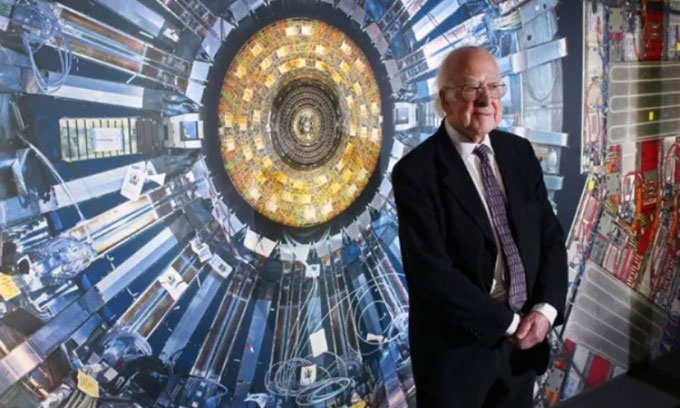Peter Higgs - Physicist who discovered the 'God Particle' passed away at the age of 94
Nobel Prize-winning physicist Peter Higgs, famous for predicting the existence of the Higgs boson, died after an illness.
Peter Higgs , the theoretical physicist who predicted the existence of the Higgs boson particle , died at the age of 94. The University of Edinburgh confirmed that the Nobel Prize-winning physicist died on April 8 after an illness. Higgs was a professor emeritus at the university, where he began working in 1960 until retiring in 1996, according to Live Science .

Peter Higgs standing in front of a photo of the Large Hadron Collider at the Science Museum in London, UK, 2013. (Photo: Peter Macdiarmid).
Higgs is famous for his pioneering research predicting the masses of subatomic particles . He was awarded the 2013 Nobel Prize in Physics along with Belgian physicist François Englert for research in the 1960s predicting the existence of a particle that gives mass to other particles when interacting with them. This particle is named the Higgs boson . After 50 years of searching, the Higgs boson was finally discovered in 2012 using the Large Hadron Collider located on the border between France and Switzerland.
Higgs was born in Newcastle, England on May 29, 1929. He received his doctorate from King's College London in 1954. A puzzling physics problem of the time was how elementary particles such as electrons and quarks acquire mass. In a 1964 paper, Higgs suggested that these particles gain mass through interactions with a field, called the Higgs field, and that the Higgs field comes from a detectable particle, the Higgs boson.
However, detecting the Higgs boson particle is a big challenge because it is very rare and decays in less than a second. It took decades of efforts for researchers to detect the Higgs boson particle and prove the Higgs hypothesis. The Higgs boson has a mass 130 times greater than a proton, but carries no charge or spin (angular momentum). Without it, other particles would have no mass.
The Higgs boson is the final missing piece of the standard model, known as the "God particle" because it helps scientists explain everything about subatomic particles and natural forces.
- He honors the father of God
- The scientist found the 'Lord's Particle' to win the 2013 Nobel Prize in Physics
- The Lord's county is one year old
- 99% chance of 'Goddess' revealed
- Adding the call to change the name of 'God's seed'
- Don't call it the Lord's seed
- The award is named Peter Higgs
- Discover the world's most powerful particle accelerator
- The universe can disappear because of
- Higgs - The last piece of nuclear physics exists?
- Important discovery: The first decay observation of the Higgs particle
- It is about to assert that 'God's seed' exists
 The most famous scientific failures in history
The most famous scientific failures in history Mysterious genius mechanic and the machine froze time
Mysterious genius mechanic and the machine froze time The son carries the 'bad gene' of genius Albert Einstein
The son carries the 'bad gene' of genius Albert Einstein Isaac Newton
Isaac Newton